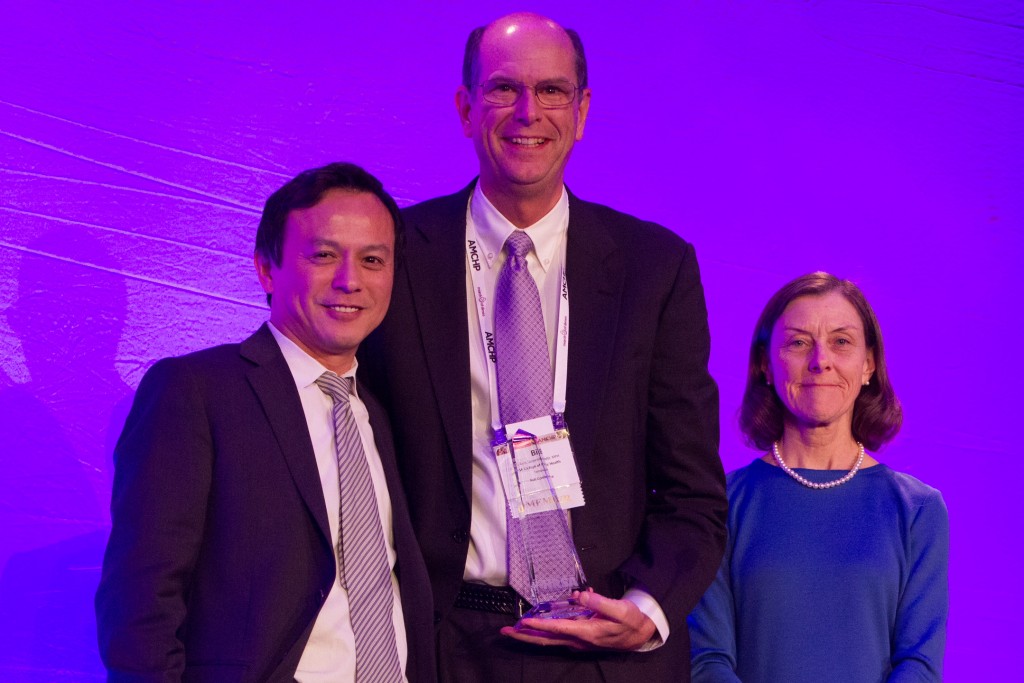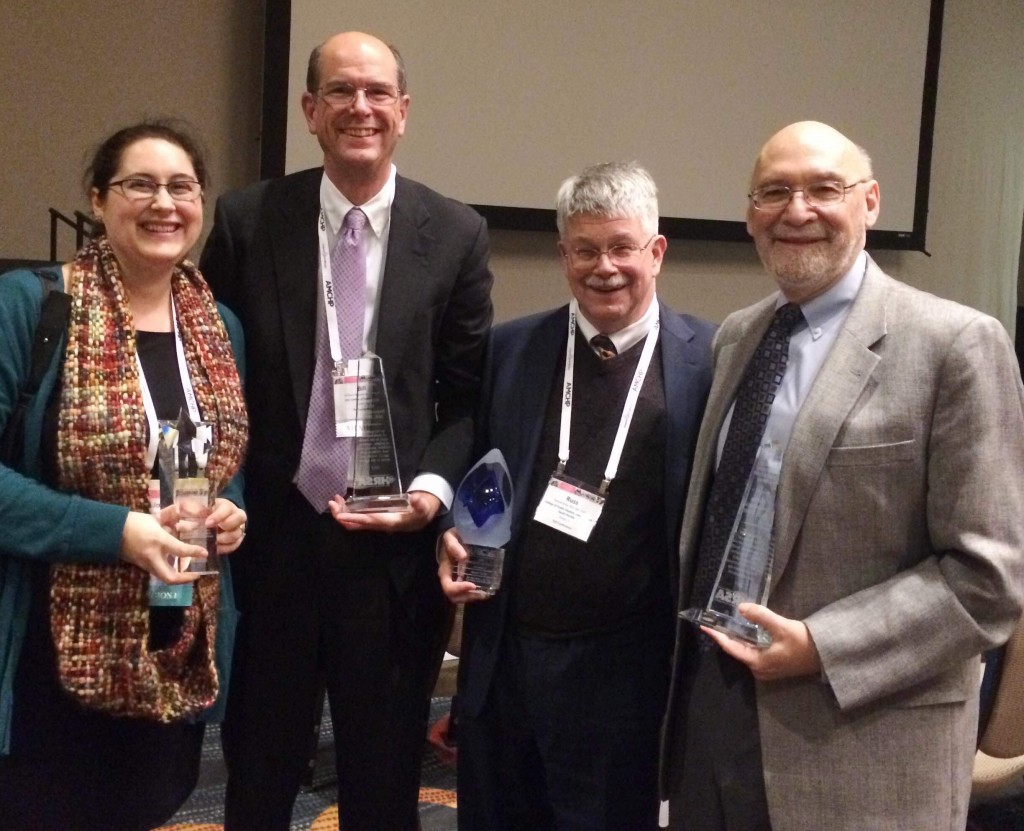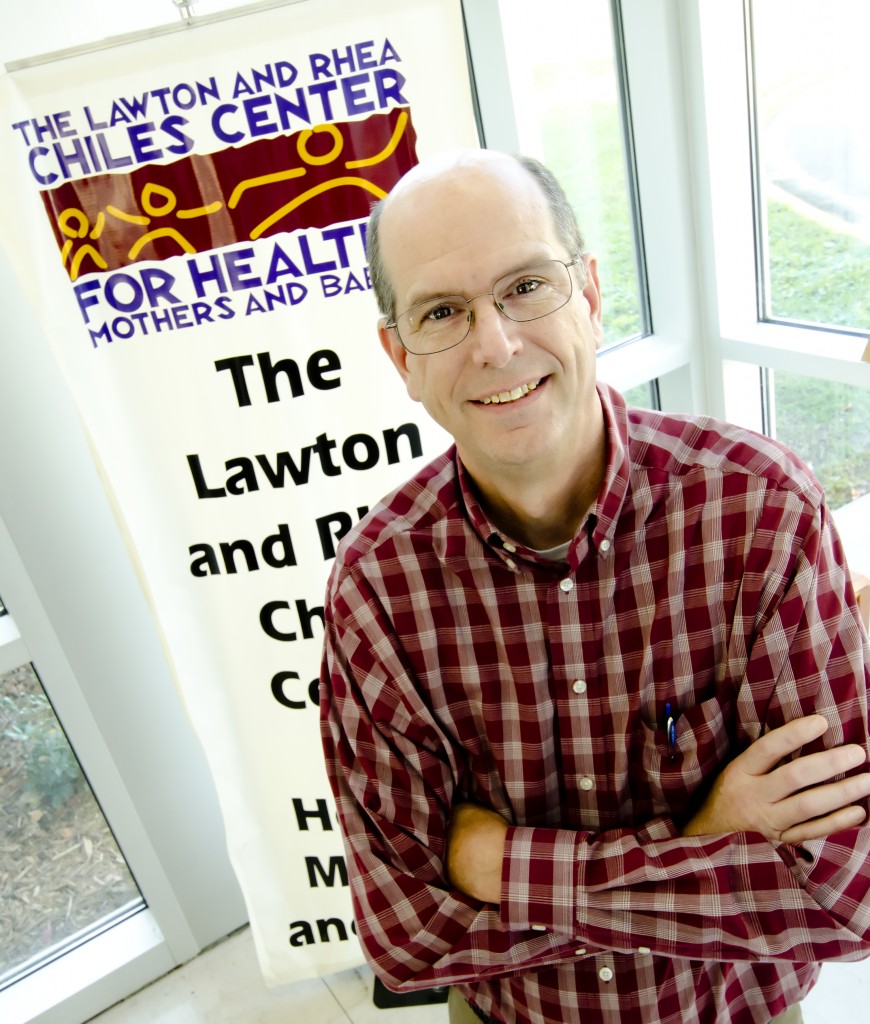Dr. William Sappenfield adds HRSA Director’s Award to list of recognitions
A board-certified pediatrician, Dr. William Sappenfield never entered traditional medical practice. While finishing his residency, he decided he wanted to enter academics, instead. Following the advice of his father, a professor and associate dean at a medical school, he applied to an NIH-CDC research training program.
“I fell in love with public health,” said Sappenfield, Community and Family Health professor/department chair and director of the Lawton and Rhea Chiles Center for Healthy Mothers and Babies. “Even though I liked the idea of taking care of children and families one at a time, I became enamored with the ability to help multiple children and families at the same time by using epidemiology as a tool.”
A widely recognized pioneer in his field, Sappenfield received the U.S. Health Resources and Services Administration’s Maternal and Child Health Bureau Director’s Award “for outstanding leadership and mentoring in promoting MCH epidemiologists nationwide” at the Association of Maternal and Child Health Programs annual conference in Washington, D.C., in late January.

Dr. Bill Sappenfield holds his HRSA Director’s Award at the AMCHP conference flanked by Dr. Michael Lu and Michelle Lawler.
Dr. Russell Kirby, USF Distinguished Professor and Marrell Endowed Chair in the Department of Community and Family Health, and COPH alumna Jordana Frost, MPH, also received recognition at the event, which drew more than 900 leading MCH professionals. Kirby delivered the keynote address.
The HRSA Director’s Award is considered a career recognition.
“The MCHB Associate Administrator annually presents this award to a few selected individuals who have made noteworthy national-level contributions to the health of infants, mothers, children, adolescents and children with special health care needs,” wrote Michele Lawler, acting director of HRSA’s Division of State and Community Health. Lawler specifically noted Sappenfield’s “years of service and … numerous contributions to the MCH field.”
“And it’s for that that he’s being recognized – for the quality improvement measures that have been disseminated with some pretty decent success here in Florida, as well as taking evidence-based best practices and reducing variation in the care of mother and baby,” said Dr. John Curran, who co-founded and co-directs the Florida Perinatal Quality Collaborative with Sappenfield.
Stressing the roles that others have played in the process, Sappenfield is humbly proud of his pioneer status.
“I started out in a field that didn’t exist at the time I started,” he said, “and then I’ve been able to contribute – with others – toward developing it into an active profession that’s making a difference for mothers and children.
“Maternal and child health epidemiology, when I started, was not even a term. No one even knew what it was. There were some people doing a little bit of perinatal epidemiology, but nothing as broad as MCH. They had cancer research, they had cardiovascular. They even had a little bit of birth defects research, but no one was as broad as maternal and child health.”
Curran, who is joint faculty with MCH and the Department of Pediatrics at the Morsani College of Medicine, helped recruit Sappenfield for the USF College of Public Health and makes it clear that he’s glad he did. Among a host of other things, Curran credits Sappenfield for the “complete rejuvenation” of the Chiles Center. In the bigger picture, Curran lauds Sappenfield’s choice of academics over medical practice.
“Bill is recognized for being probably the premier perinatal epidemiologist in the country,” Curran said. “Here, in an academic environment, he has graduate students, he’s attracting a following rapidly, and he has less direct influence from governmental funding and constraints. He’s working very hard for a brighter future, and I think this award is a tribute to his success.”
In 1987, Sappenfield became the first career MCH epidemiologist for the Centers for Disease Control.
“There had been others who had been practicing like this,” he explained with typical humility, “but it was the first time CDC recognized it as an actual program where we put, not trainees, but actual professionals in the field.”
“He had memorable achievements in maternal and child health in South Carolina, which is where I first learned about him,” Curran said. “His interest was in where mothers should deliver their babies and would the outcome be better if they were in a more sophisticated center versus a simple birthing center. His paper from then – it’s 25 years ago – is still often quoted in the literature and now has been resurrected by the obstetricians.”
In the succeeding decades, numerous colleges have begun offering MCH epidemiology concentrations and MCH epi doctoral degrees. A biennial conference draws in excess of 500 attendees. Public health organizations – 16 to be exact – have begun giving MCH epi awards. A professional journal is widely circulated. When Sappenfield isn’t a contributor, someone else likely is citing or quoting his work.
“We now train people to work on maternal and child health issues,” he said, “recognizing that they’re not individual issues – that what might affect birth defects might also affect prematurity, which also affects infant mortality, and it all might relate to the whole life course of the mother. Did she have a teen birth? Did she have adequate education?
“All of those pieces are wrapped up together, and we know that we need to train people who have that broader perspective of family and how that broader perspective actually needs to affect policy and program in an applied public health perspective, just like you would infectious disease epidemiology when you’re trying to deal with outbreaks.”
Sappenfield’s role as a ground-floor member of the field has included mentoring countless post-doctoral fellows and young professionals.
While directing the CDC’s MCH epi program and focusing it squarely on expansion into a national effort, he chaired the first committee on MCH epi awards and did some of the early work on fetal and infant death reviews.
He is credited with leading the development of Perinatal Periods of Risk, an infant mortality analytical method that has become the standard of practice for communities to assess infant mortality and address those risks.
“The concept of toxic stress on the pregnancy period as well as the early child development period, have become major directions of interest of the Maternal and Child Health Bureau, an agency with a long history of achievements but a new direction,” Curran noted. “Bill is seen as one of the leaders of that direction.”
Sappenfield’s long list of recognitions include the National MCH Epidemiology Leadership Award. It was just days before the AMCHP conference that he learned he would be receiving the HRSA’s Director’s Award, recognition at a time in his career when he has already seen some of his former students and mentees gain national recognition of their own.
“I was humbled to get the award,” Sappenfield said. “Michael Lu, who presented it to me, is one of the leading researchers and advocates for the life course approach for children, and he came to one of the training institutes that I had arranged. That was how he got some of his first exposure to MCH epidemiology. He liked what he saw and has embraced that as a core component of his work.
“It’s just humbling when you have people who you’ve been working with who think what you’re doing deserves recognition. It’s always nice to be recognized by your peers.”
“This is major national recognition,” Curran said. “It’s a recognition of an impact on the outcomes for mothers and children that Bill achieved from a long career as an epidemiologist with a lot of achievements, and it is very well deserved.”

With their various AMCHP awards are, from left, Jordana Frost, Dr. Bill Sappenfield and Dr. Russ Kirby from USF, and Dr. Milt Kotelchuck from Harvard University.
Related story:
Dr. Russell Kirby receives McQueen Award, delivers keynote speech at AMCHP Conference
Story by David Brothers, College of Public Health. Photos courtesy of Eric Younghans, USF Health Communications, and Dr. Bill Sappenfield.

